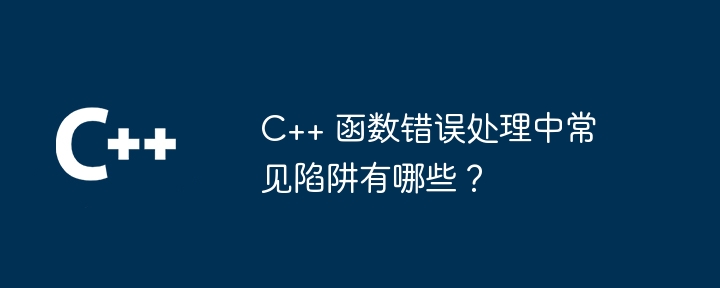Home >Backend Development >C++ >What are the common pitfalls in C++ function error handling?
What are the common pitfalls in C++ function error handling?
- 王林Original
- 2024-04-23 13:06:01586browse
Common pitfalls of C function error handling include: Overusing exceptions Skipping error checks Improperly freeing resources Not checking function parameters for validity Ignoring warnings Mixing errors into data Avoiding these pitfalls ensures that you write reliable, maintainable C code.

Common Pitfalls in C Function Error Handling
When writing robust and reliable programs in C, handling errors correctly is crucial . However, there are some common pitfalls in function error handling that can lead to subtle errors and difficult-to-debug code.
1. Overuse of Exceptions
While exceptions are powerful tools for handling errors, overusing them can reduce code performance and make debugging difficult. Exceptions should only be used in cases of unrecoverable errors or to signal to the caller that immediate action is required.
2. Skip error checking
Some programmers tend to skip error checking to speed up development or simplify code. However, this can lead to unexpected behavior and difficult-to-diagnose problems. Always error-check the return value of a function and take appropriate action to handle errors.
Practical case:
int get_file_size(const char* filename) {
FILE* fp = fopen(filename, "rb");
if (!fp) {
return -1; // 文件打开失败,返回-1
}
fseek(fp, 0, SEEK_END);
int filesize = ftell(fp);
fclose(fp);
return filesize;
}
int main() {
int filesize = get_file_size("myfile.txt");
if (filesize == -1) {
// 文件打开失败,处理错误
} else {
// 继续处理文件...
}
}3. Improper release of resources
When a function allocates resources (such as memory or file descriptors ), you must ensure that these resources are released correctly when the function exits. Improperly releasing resources can lead to memory leaks or other system errors.
4. Not checking the validity of function parameters
When calling a function, it is important to ensure that the function parameters are valid. Passing in invalid parameters may cause undefined behavior or program crash. All parameters should be checked for validity within the function.
5. Ignore warnings
Compilers and static analysis tools can help identify potential error handling problems. Ignoring warnings can lead to undetected defects that may appear at runtime.
6. Mixing errors into data
Mixing errors into data (such as returning special values or changing normal values) can lead to serious confusion and misdiagnosis. Error handling should be separated from data output.
Practical Example:
int divide(int a, int b) {
if (b == 0) {
return 0; // 试图通过返回0来处理除零错误
}
return a / b;
}
int main() {
int result = divide(10, 0);
if (result == 0) {
// 除零错误,处理错误
}
}Conclusion:
Avoiding these common pitfalls is crucial to writing robust C programs. By following best practices and carefully examining error handling, you can create reliable, maintainable code.
The above is the detailed content of What are the common pitfalls in C++ function error handling?. For more information, please follow other related articles on the PHP Chinese website!

